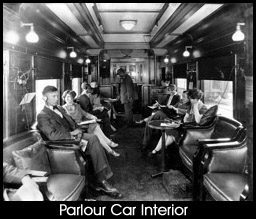Thornton was a master of promotion and radio was soon to be his chief weapon in establishing his company’s credentials. When a special party organized by the Brooklyn Daily Eagle traveled by CNR from Montreal to the west coast to attend the opening of Alaska’s Mount McKinley National Park, an observation-lounge car was equipped with radio receiving equipment for them. As they departed Montreal’s Bonaventure Station on July 23, 1923, they heard a special program of greetings and music coming from the leased facilities of CHYC, Northern Electric’s Montreal station. The special broadcast was reported across Canada and given considerable play by the Brooklyn newspaper, which was then one of the most influential in the New York area.

Lounge and parlour cars were soon equipped with radio receivers, loudspeakers and headsets and assigned to 16 of its “name trains,” such as The International Limited (Montreal-Chicago), The Ocean Limited (Montreal-Halifax), The National (Toronto-Winnipeg) and The Continental Limited (Montreal-Toronto- Vancouver). Operators were hired to ride with these cars and tune in programs from local Canadian stations and such high-power U.S. stations as WEAF New York, WJW Detroit, KDKA Pittsburgh and WGN Chicago.
The first six months of CNR broadcasting included an even more newsworthy broadcast, in which former British Prime Minister David Lloyd George heard a special program of world news as he traveled from Montreal to Ottawa on October 9, 1923. He was then interviewed on the air by a group of Canadian, American and British newspaper correspondents. This time the CNR gained headlines on both sides of the Atlantic.
1923 ended with what is thought to be Canada’s first scheduled commercial network broadcast. On December 30, using Northern Electric’s CHYC in Montreal and the Ottawa Radio Association’s station OA, a special program of speeches and music was broadcast to and from both cities, under sponsorship of the CNR.
Having proved the technical feasibility of network radio, the CNR began to focus on programming improvements. From the start of the service, the operators on the radio-equipped cars had complained not just of difficulties of tuning-in the sparsely-located low power Canadian stations, but also of finding programs that were of a high-enough quality to entertain the passengers. Sir Henry decided that the only solution was for the CNR to take a direct hand in the provision of reliable and interesting shows
